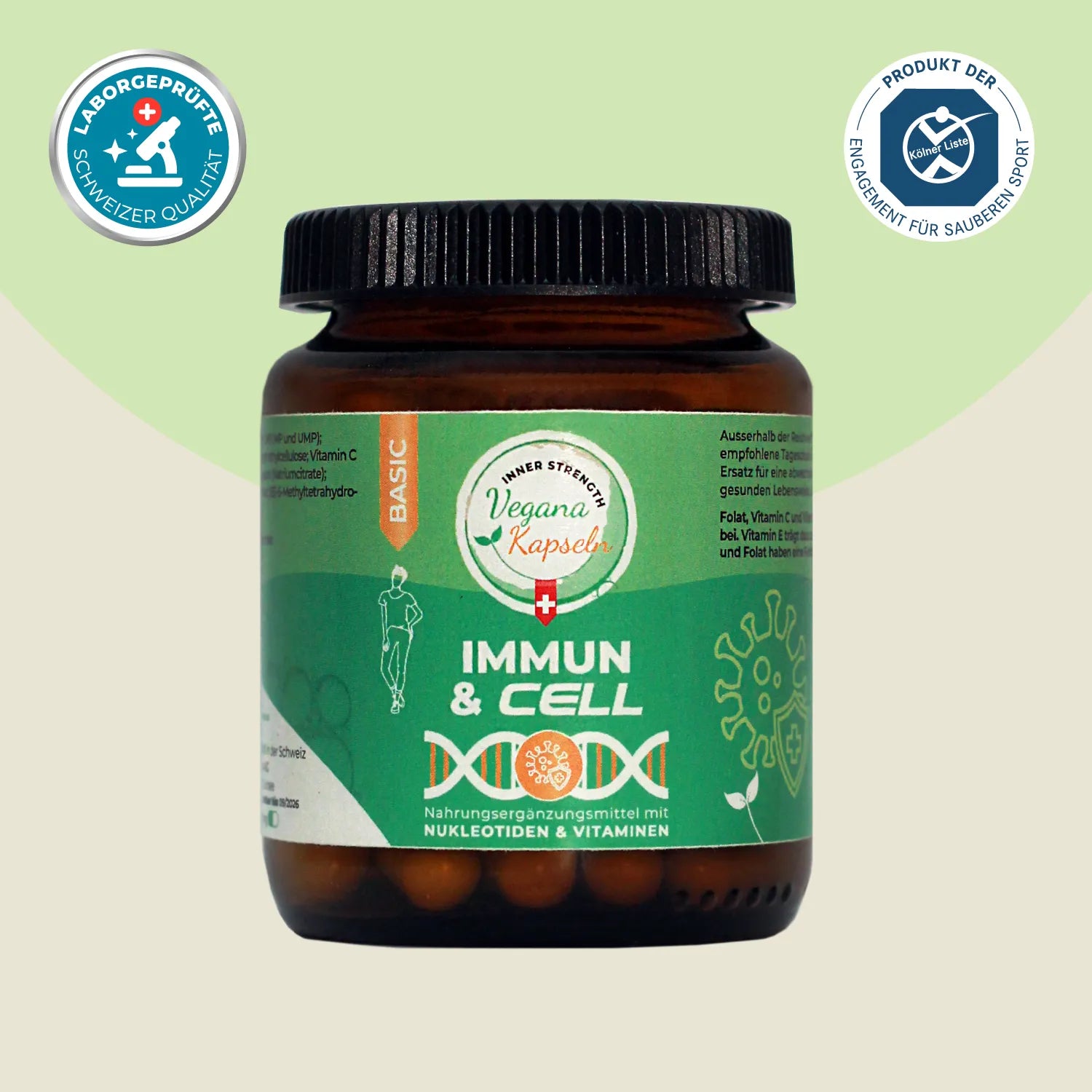Strengthen mitochondria: 7 tips for more energy in your everyday life
Did you know that your body is home to billions of cellular power plants? These are your mitochondria. These cell organelles are extremely important for your energy metabolism: if you often feel tired, listless and exhausted, your mitochondria could be the cause.
In this article, we summarize for you exactly what mitochondria are and why it is important to strengthen them. We also give you seven simple tips for your everyday life to help you strengthen your mitochondria.
Cellular power plants: What are mitochondria?
Mitochondria are found in every cell of the body and are crucial for energy production.
Learn moreStrengthen mitochondria: Why is this important?
You should strengthen your mitochondria as they can give you more energy.
Learn moreTip 1: Strengthen your mitochondria with nucleotides:
Nucleotides can help to strengthen your mitochondria and contribute to a better energy metabolism.
Learn moreTip 2: Strengthen mitochondrial function with the right diet:
Intermittent fasting, for example, is a good way to strengthen your mitochondria.
Learn moreCellular power plants: What are mitochondria?
Mitochondria are found in all cells in your body. There they are responsible for the regeneration of adenosine triphosphate (ATP). This is crucial because ATP is an energy carrier in your cells. You will therefore often hear that mitochondria are considered the powerhouses of your cells - this is because they play a key role in energy production.
Mitochondria are found in every cell. The exact number depends on how much energy the cell needs. There are cells that require a particularly large amount of energy (heart cells, muscle cells, nerve cells): There are therefore significantly more mitochondria in these cells than in others.
Strengthen mitochondria: Why is this important?
You have now learned that mitochondria produce energy and are extremely important for your body. However, as you get older, this also affects your mitochondria.
Researchers suspect that damaged mitochondria can trigger or at least promote various diseases. These include Alzheimer's, cancer and diabetes. Studies show that there may well be a link between damaged mitochondria and these diseases.
From around the age of 30, the number of mitochondria decreases and their activity also slowly declines. The mitochondrial network can also be damaged by a lack of sleep, stress, environmental toxins and other factors. As a result, you have less energy in everyday life and your performance decreases as you lack the ATP from the mitochondria.
Tip 1: Strengthen your mitochondria with nucleotides
Our mitochondria are a decisive factor in our energy metabolism. If you want to strengthen your mitochondria, you can rely on nucleotides.
Nucleotides are the basic building blocks of DNA and RNA: they perform vital functions in your cells. Among other things, they are involved in the transmission of signals and energy production. ATP, which we have already mentioned, is a nucleotide and an important energy carrier in your cells.
You therefore have the option of strengthening your mitochondria through nutritional supplements. To do this, you can take nucleotides in various forms. For example, you can buy nucleotide capsules from us. In addition to nucleotides, these also contain various vitamins and micronutrients, which can also have a positive effect on your energy metabolism.
We also offer nucleotide protein powder, which you can use to easily prepare a shake. The nucleotide powder contains a special nucleotide mix for combining with proteins: This makes it ideal for dietary nutrition and athletes. We also offer our NukleoSports - PRO for athletes and sportspeople.
Tip 2: Strengthen mitochondrial function with the right diet
If you want to strengthen your mitochondria and boost energy production, you should also pay attention to the right diet. Make sure you eat a balanced and varied diet. You should provide your body with all the important nutrients and supplement them if necessary.
Research has also shown that hunger triggers certain metabolic processes in our bodies. In evolutionary terms, humans did not eat large portions three times a day, but also had to endure periods without food. Research therefore assumes that fasting and intermittent fasting can have a positive effect on our mitochondria.
Intermittent fasting as a boost for your metabolism
With intermittent fasting, you restrict the time in which you eat. With 16:8 fasting, you are allowed to eat for eight hours and go without food for the remaining 16 hours of the day. Your body then activates the post-absorptive metabolism: although you are not eating, your cells receive energy. As you consume fewer carbohydrates, intermittent fasting can also help you lose weight.
Tip 3: Avoid sugar
Your mitochondrial network can be damaged by excessive sugar consumption. If you consume a lot of sugar, your mitochondrial metabolism can shut down and you lack energy.
At the same time, sugar is associated with diseases such as type 2 diabetes or fatty liver. People who suffer from such diseases often also have impaired mitochondrial function.
It is therefore advisable to consume as little sugar as possible in everyday life. Processed foods in particular often contain a lot of hidden sugar: try to cook fresh and eat as much fruit, vegetables and nuts as possible.
Tip 4: Strengthen the power plants of your cells with micronutrients
The formation of ATP requires oxygen, fatty acids, sugar and amino acids, among other things. Vitamins are also an essential component, as they are considered cofactors for mitochondrial enzymes. You should therefore make sure that you take B vitamins in particular:
Vitamin B1
Vitamin B2
Vitamin B3
Vitamin B5
Vitamin B6
Your body needs these vitamins, but cannot produce them itself. Many people do not consume sufficient amounts of these vitamins in their diet. However, you need them so that your metabolism and energy metabolism can function optimally.
Trace elements are also crucial. These include iron, zinc and selenium. Coenzyme Q10 and coenzyme PQQ are also important.
As you can see, there are a variety of vitamins and micronutrients that your mitochondria need to produce energy. Getting these from food can be a challenge. That's why our nucleotide capsules not only provide you with nucleotides, but also with vitamins.
Our Immune & Cell + Nucleotides capsules also contain vitamin C, vitamin E and vitamin B 12. They can therefore also be taken in cases of mitochondrial dysfunction.
Tip 5: Get enough exercise
You probably know that it is important to get enough exercise. In fact, exercise not only has benefits for your muscles and endurance, but also for your mitochondria.
Exercise stimulates your metabolism. Whether you do strenuous muscle training or go for an hour's walk, your metabolism will benefit. This also ensures that your mitochondria can produce more energy.
In general, muscle training is also a good tip for strengthening mitochondria. This is because your muscles contain a particularly large number of mitochondria. So if you train your muscles, you also train your mitochondria at the same time.
Tip 6: Consume as few harmful substances as possible
To strengthen the function of your mitochondria, you should take a close look at your diet. If you consume a lot of harmful substances in your diet, this can have a negative impact on your mitochondria and your energy metabolism.
We have summarized some tips for you:

Consume organic fruit and vegetables:
To ingest as few harmful substances as possible, you should eat certified organic fruit and vegetables. This is because conventional products can contain residues of weed killers and pesticides. According to research, these harmful substances could damage the mitochondria.

Mix fruit and vegetables:
Also try to eat as many different types of fruit and vegetables as possible. This will ensure that you consume a particularly comprehensive mix of vitamins and trace elements. The more colorful your plate looks, the better it is for your mitochondria.

Avoid ready meals:
If you want to avoid harmful substances as much as possible, you should consistently avoid ready meals and highly processed foods. These often contain a lot of sugar, additives and preservatives that could damage your cells.

Be careful with meat products:
Meat from factory farming can contain antibiotic residues. Pigs, chickens and cattle in particular often have to be treated with antibiotics, the residues of which you then ingest. Therefore, buy the highest quality meat possible to prevent excessive intake of harmful substances.
As you can see, it's not that difficult to reduce your intake of harmful substances in everyday life. Pay conscious attention to what you eat and which products you put on your plate to keep your mitochondria healthy.
Tip 7: Get enough sleep
In addition to a balanced diet and exercise, sleep is also extremely important if you want to strengthen your mitochondria. This is because your body makes adjustments to your metabolism when you sleep.
At the same time, little sleep promotes oxidative stress, while important enzymes that are supposed to neutralize free radicals are less active. Research suggests that this situation can even change the mitochondrial structure in the long term.
We therefore advise you to get enough sleep. This can promote healthy mitochondria and increase your well-being at the same time.
FAQ: Frequently asked questions about the power plants in our cells
The term cellular respiration refers to a process in which your mitochondria produce energy and provide it to your body. Five protein complexes work together to form an electron transport chain - a so-called respiratory chain. The term cellular respiration is derived from this.
Mitochondria are damaged by high levels of stress and chronic inflammation. But environmental pollutants can also have a negative effect on the function of your mitochondria. So make sure you lead a healthy lifestyle to strengthen your mitochondria.
Yes, mitochondria can usually regenerate and resume their function. Furthermore, it is even possible for your body to form new healthy mitochondria. To do this, provide it with nucleotides, exercise and eat a healthy diet.
Conclusion: Strengthen your mitochondria with nucleotides & a healthy lifestyle
You can prevent mitochondrial diseases with targeted measures. If your mitochondria are damaged, they can produce less energy: As a result, you may feel tired and exhausted. We recommend nucleotides: they have a positive effect on the processes of your energy metabolism, strengthen your mitochondria and also your immune system.
In combination with a healthy lifestyle - a balanced diet, plenty of sleep and sufficient exercise - you can strengthen your mitochondria as an important source of energy and have more energy in everyday life. You can purchase the right products for this in our store.





